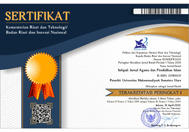Peran Guru Pendidikan Agama Islam Dalam Mencegah Kekerasan Peserta Didik di Madrasah
Abstract
This article explains the importance of religious education in providing values and preventing social violence inmadrasas,especiallyPAIteachers. The purpose of religious education inmadrasasis the same as the purpose of life that is owned by every human being, including Muslims. Education also aims to humanize humans, meaning that a student must be treated well and be able to respect their opinions even if they are wrong. However, as an educator, they must be able to guide them by using their intelligence to achieve the desired goals in the future. Therefore, the success or failure of thePAIlearning process is determined or influenced by environmental conditions, one of which is themadrasaenvironment. The role of PAIteachers in overcoming bullying behavior inMadrasasis divided into several stages. First, bullying behavior that involves physical means is an act of violence committed by the perpetrator of the bullying against. The victim by controlling the victim with the power possessed by the perpetrator. Second, bullying behavior that is verbal or non-physical means an act of violence committed by the perpetrator against the victim by using satire, threatening, slandering each other, bullying, insulting, and so on. This research is a type of research that uses a qualitative approach. Therefore, the presence of Islamic Religious Education Teachers is expected to change attitudes and behavior. Through learning provided by competent educators and must be sensitive to the situation because the teacher's role like as a facilitator and mediator for his students.
Keywords
Full Text:
PDFReferences
Agustina, N. (2018). Perkembangan peserta didik. Deepublish.
Baharun, H., & Zulfaizah, Z. (2018). REVITALISASI PENDIDIKAN AGAMA DALAM PEMBENTUKAN KARAKTER PESERTA DIDIK DI MADRASAH. ELEMENTARY: Islamic Teacher Journal, 6(1), 4362.
Burhanuddin, H. (2019). Pendidikan Karakter Dalam Perspektif Al Quran. Al-Aufa: Jurnal Pendidikan Dan Kajian Keislaman, 1(1), 19.
Eisenbraun, K. D. (2007). Violence in schools: Prevalence, prediction, and prevention. Aggression and Violent Behavior, 12(4), 459469.
Hidayat, A., Sadiyah, M., & Lisnawati, S. (2020). Metode Pembelajaran Aktif dan Kreatif pada Madrasah Diniyah Takmiliyah di Kota Bogor. Edukasi Islami: Jurnal Pendidikan Islam, 9(01), 7186.
Hidayat, J. A. (2019). Peran Guru Dalam Menanggulangi Perilaku Bullying Pada Siswa Madrasah Ibtidaiyah Maarif Klangon Kalibawang Kulon Progo Yogyakarta Tahun Pelajaran 2018/2019. At-Tajdid: Jurnal Ilmu Tarbiyah, 8(2), 293315.
Hiqmatunnisa, H., & Zafi, A. A. (2020). Penerapan Nilai-Nilai Moderasi Islam Dalam Pembelajaran Fiqih Di PTKIN Menggunakan Konsep Problem Basic Learning. JIPIS. Doi, 10.
Irsad, M. (2016). Pengembangan Kurikulum Pendidikan Agama Islam Di Madrasah (Studi Atas Pemikiran Muhaimin. Jurnal Iqra: Kajian Ilmu Pendidikan, 1(2), 230245.
Leach, F., & Humphreys, S. (2007). Gender violence in schools: taking the girls-as-victims discourse forward. Gender & Development, 15(1), 5165.
Mansir, F. (2017). Model Pendidikan Karakter Di Perguruan Tinggi Islam (Studi Pada Umi Dan Uin Alauddin Makassar).
Mansir, F. (2018a). Diskursus Pendidikan Karakter di Peguruan Tinggi Keagamaan Islam pada Era Milenial. Tadrib, 4(2), 280300.
Mansir, F. (2018b). Pendekatan Psikologi Dalam Kajian Pendidikan Islam. Psikis: Jurnal Psikologi Islami, 4(1), 6173.
Mansir, F. (2019). Implications of Teacher Certification on Professionalism and Welfare of 21th Century PAI Teachers. Tadrib, 5(2), 138152.
Mansir, F. (2020a). Diskursus Sains dalam Kurikulum Pendidikan Agama Islam di Sekolah dan Madrasah Era Digital. Kamaya: Jurnal Ilmu Agama, 3(2), 144157.
Mansir, F. (2020b). Identitas Guru PAI Abad 21 Yang Ideal pada Pembelajaran Fiqh di Sekolah dan Madrasah. Muslim Heritage, 5(2), 435.
Mansir, F. (2020c). Kesejahteraan Dan Kualitas Guru Sebagai Ujung Tombak Pendidikan Nasional Era Digital. Jurnal IKA PGSD (Ikatan Alumni PGSD) UNARS, 8(2), 293303.
Mansir, F. (2020d). The impact of globalization on islamic education toward fiqh learning existence in covid-19 pandemic period. ATTARBIYAH: Journal of Islamic Culture and Education, 5(2), 123133.
Mansir, F. (2020e). The Leadership of Personnel Management in Islamic Education: Emerging Insights from an Indonesian University. Edukasia Islamika, 116.
Mansir, F. (2021). Analisis model-model pembelajaran fikih yang aktual dalam merespons isu sosial di sekolah dan madrasah. Tadibuna: Jurnal Pendidikan Islam, 10(1), 8899.
Mansir, F., & Karim, A. (2020). Islamic education learning approaches in shaping students emotional intelligence in the digital age. Hayula: Indonesian Journal of Multidisciplinary Islamic Studies, 4(1), 6786.
Mansir, F., & Purnomo, H. (2020). Urgensi Pembelajaran Fiqih dalam Meningkatkan Religiusitas Siswa Madrasah. Jurnal Al-Wijdan, 5(2).
Retno, A. P. (2008). Meredam Bullying. Jakarta. PT Gramedia Widiasarana Indonesia.
Yurtal, F. (2014). Violence in schools: From the perspective of students, teachers, and mothers. Educational Research and Reviews, 9(24), 14201427.
DOI: https://doi.org/10.30596/intiqad.v13i2.8164
Refbacks
- There are currently no refbacks.
Intiqad Jurnal Agama dan Pendidikan Islam is abstracting & indexing in the following databases:
View My StatsEditorial Address:
Faculty of Islamic Religion, Universitas Muhammadiyah Sumatera Utara. Jl. Mukhtar Basri No. 3 Medan 20238 Telp. (061) 6622400 ext. 27 dan 28 Fax. (061) 6625474. e-mail: intiqad@umsu.ac.id

_(1).png)























